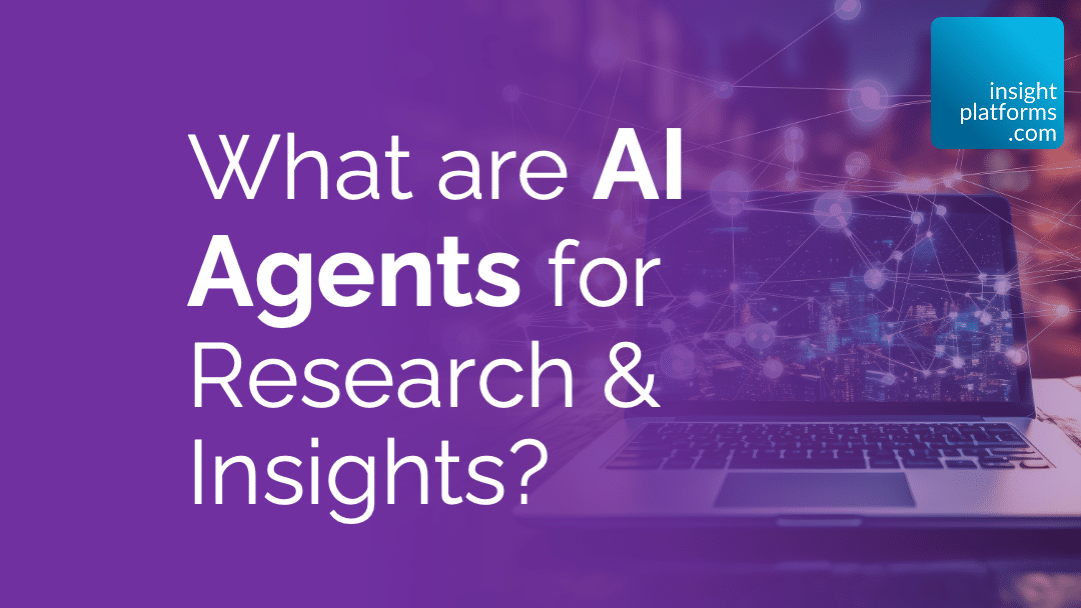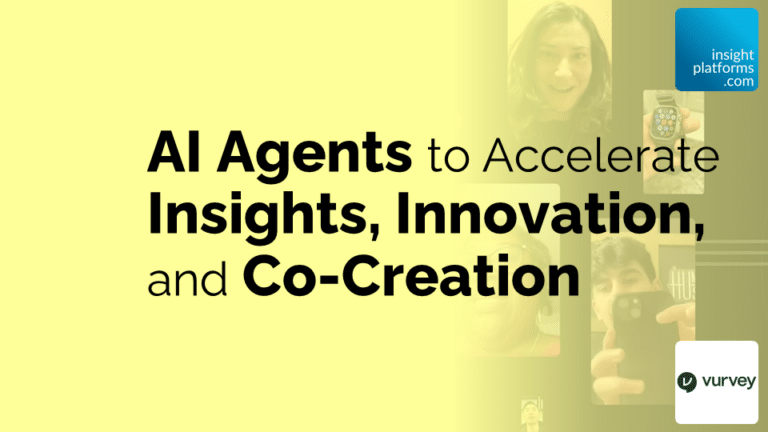
What are AI Agents for Research & Insights?
By Insight Platforms
- article
- Conversational AI
- Artificial Intelligence
- Generative AI
You may have heard about AI agents before. You’ve surely heard about AI assistants like ChatGPT, Google Gemini and Microsoft CoPilot – they are everywhere these days. They help marketing teams write blogs, help sales teams to create pitches and – increasingly – help researchers and insights professionals to work more efficiently.
AI assistants are used to summarize qualitative data, find key insights in video transcripts, and even create first drafts of research reports. But what if you could string together specialist AI assistants to complete more work rather than just individual tasks?
That’s where AI agents come in: think of them as a team of AI tools, each with their own specialist skills, working together to complete more parts of projects autonomously.
AI agents for research and insights are autonomous software entities designed to perform specific tasks by perceiving their environment, making decisions, and executing actions based on predefined objectives.
Unlike simple large-language models (LLMs) like GPT, which primarily function based on input, AI agents are able to derive patterns from data, make informed decisions, and interact with other agents to complete tasks in synergy.
Think of a team of AI agents as a sports team:
- Each agent has its own role and abilities
- AI agents collaborate, sharing information and feedback to develop the best solution or outcome
- Each AI agent provides valuable oversight that optimizes the performance of other agents based on the analysis of ongoing tasks
Learn more about AI agents for research & insights in this webinar with Vurvey:
AI Agents to Accelerate Insights, Innovation and Co-Creation
How AI Agents Surpass Traditional AI Tools
AI agents engage with their environment in a continuous loop, constantly gathering data, analyzing it, and then responding with calculated strategic actions. By building on existing algorithms, particularly LLMs and machine learning (ML), AI agents can perform more intricate operations.
While conventional AI tools operate in isolation, performing specific tasks with limited adaptability, AI agents introduce a shift towards more dynamic and collaborative intelligence.
Traditional AI assistants are designed to follow a structured format and specific rules. AI agents are designed to grow with experience and be able to perceive, reason, and act autonomously within complex challenges or environments.
How can AI “perceive and learn”?
Through advanced machine learning techniques, AI agents handle multifaceted, complex, and dynamic tasks–however, the effectiveness of this heavily relies on the quality of training data and human involvement in the learning process. Continuous refinement ensures AI agents evolve with experience.
While the concept of being able to employ a functional and dynamic AI team of “assistants” for research is enticing, there’s a heightened risk of propagating errors throughout analyses.
Like the saying goes: “With great power, comes great responsibility.” Human supervision becomes increasingly essential as artificial intelligence is used to complete more complex tasks and research. If one AI agent misinterprets data, these errors could reverberate throughout the entire research process, significantly impacting outcomes.
AI agents are far from replacing human participation in research but they are able to streamline data and processes for enhanced efficiency and innovation.
How do AI Agents Work Together for Research and Insights?
AI agents can share data between themselves, delegate tasks based on specialized skills, and synchronize efforts to create a cohesive unit. However, facilitating teamwork between machines is not so simple—in order for AI agents to work together effectively, coordination and communication mechanisms are essential.
Sharing Data and Insights: AI agents exchange information to ensure that each agent has access to the most relevant and up-to-date data. This enables them to make informed decisions and generate accurate insights.
Delegating Tasks Based on Specialized Skills: Different AI agents may possess specialized skills or expertise in various domains. By delegating tasks to the most suitable agent, the team can optimize efficiency and accuracy.
Real-Time Updates and Synchronization: To maintain coherence and avoid conflicts, AI agents must synchronize their actions and updates in real time. This ensures that all agents are aligned and working towards the same goal.
Working as a network of collaborators pooling together their diverse knowledge and insights, AI agents can identify innovative solutions that might be overlooked by individual units.
Applications of AI Agent Collaboration
While this may be your first time learning about AI agents in-depth, chances are you’ve already witnessed AI agent teams in action or have reaped the benefits of this new-age teamwork:
- Autonomous Systems: Self-driving cars are a prime example of how AI agents work together. Relying on multiple AI agents to navigate safely, self-driving cars may utilize an agent for real-time traffic data, another for obstacle detection, and another for route optimization. By collaborating, these agents ensure a smooth and safe driving experience.
- Healthcare: AI agents are transforming healthcare by improving diagnostics, personalized treatment plans, and patient monitoring. For example, one AI agent might analyze medical images for signs of disease, while another processes patient records to recommend tailored treatments. By working together, these agents can provide more accurate diagnoses and better treatment outcomes, and in addition, AI agents can continuously monitor patients and alert healthcare providers to any changes in condition, ensuring timely interventions.
When it comes to research and insights, AI agents are starting to be infused into research processes and methodologies, for example:
- Vurvey’s vTeam is a collection of different AI assistants to help automate the process interviewers go through from research through insights to action. vTeam allows users to create workflows and set objectives and collaborate with a virtual team of AI agents (research assistants and buyer personas that represent customer segments). Each agent can be guided to perform specific tasks, such as generating visual inspiration, trends, and insights, all while leveraging data collected from Vurvey’s video survey campaigns or private datasets.
- Zappi’s Marketing Agents can create, visualize, validate, and test product concepts, packs, strategies and communications using insights from a variety of categories/buyer segments leveraging Zappi’s dataset.
Combining the strengths of multiple intelligent systems working together, businesses and industries means we can unlock new opportunities, drive innovation, and overcome complex challenges.
Ethical Considerations and Challenges
Essential to the ethical deployment of AI and AI agents is the need for transparency, which involves clearly explaining AI processes and decisions to users and stakeholders. Ensuring that AI decisions are traceable is another critical issue, as it allows for accountability when decisions affect individuals’ lives. This traceability not only helps in debugging the systems but also in understanding the rationale behind AI decisions in critical scenarios such as healthcare and law enforcement.
Data protection is equally important, given the vast amounts of personal and sensitive respondent data AI systems can process. Protecting this data from breaches and ensuring it is handled ethically is crucial to prevent misuse and potential harm to individuals. Addressing these ethical concerns is not just about avoiding harm; it is about proactively building systems that enhance societal trust and encourage responsible AI development and usage. This involves developing policies and guidelines that ensure AI systems are fair, non-discriminatory, and beneficial to all.
A final note
As AI agents become more integrated into critical systems, ethical and security considerations become paramount. Ensuring that AI agents operate transparently and ethically is crucial for maintaining public trust. Additionally, proactive security measures are needed to prevent unauthorized access to sensitive data.
The future of research and insights is bright, and AI agents are poised to play a central role in shaping it with the right humans working behind them.


